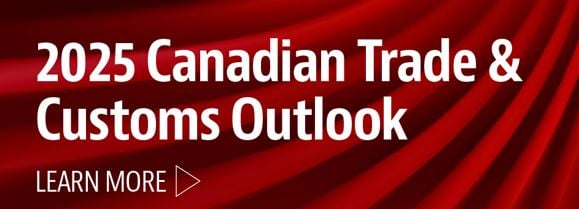Baker McKenzie’s Canadian international trade and customs team is publishing a series of articles reviewing 2024 trade and customs compliance developments and looking ahead to 2025’s burgeoning issues. This article focuses on Canada’s export controls regime.
Before we dive into the export controls outlook, here is an overview of the current state of politics in Canada, which includes a discussion of the legislative powers that remain while Canadian Parliament is prorogued until March 24, 2025.
(Click the image to play the video)

In 2024, the Government of Canada administered Canada’s export controls as a foreign policy tool, unilaterally expanded the scope of Canada’s export controls when multilateral export control arrangements stalled due to geopolitical conflicts, and made international commitments to enhance enforcement to curtail export control circumvention.
Looking ahead, we expect that the Government will be introducing further unilateral export controls in the months ahead. The Government recently published proposed unilateral controls for public consultation, which we expect to come into force as drafted in Q1 2025 and recent consultations focused on economic security measures noted the possibility of introducing export controls on Canadian critical minerals. The Government has also proposed legislative amendments to the Export and Import Permits Act to provide authority to restrict the import/export of items in response to acts of foreign states that could “harm Canada” or to create a secure and reliable supply chains. Beyond these proposed legislative changes, we expect Canada to continue to enhance enforcement of its export controls along with its fellow G7 members.
Exporters can prepare for 2025 Canadian export controls developments as follows:
- Review export control classifications and have ready access to supporting technical specifications in case goods are selected for a trade control verification by the Canada Border Services Agency (CBSA).
- Carefully review Canada’s newly implemented unilateral export controls and proposed unilateral export controls.
- Stay up-to-date on recently issued G7 joint guidance on export control anti-circumvention measures and ensure compliance systems and personnel are adequately trained on newly identified red flags.
- Stay up-to-date on Canadian political developments, which will impact how the Export Controls Division of Global Affairs Canada exercises their discretion in issuing or denying export permit requests.
- Review recent enforcement actions that have a nexus to Canada to bolster understanding regarding complex anti-circumvention schemes.
Export Permitting as a Foreign Policy Tool
In 2024, Canada wielded its export controls as a foreign policy tool to encourage and deter activities by foreign states. For example, in January 2024, Canada began to issue export and brokering permits for goods destined to Turkey. Canada’s policy since October 2020, was to presumptively deny export and brokering permits for controlled goods destined to Turkey following allegations that Canadian technology was used in unmanned aerial vehicles exported to Turkey. However, Canada’s presumptive denial policy changed in late January 2024 when a final report on the matter was published and Turkey agreed to welcome Sweden into the North Atlantic Treaty Organization (NATO).
Additionally, without any public notice, as of January 2024, Canada has been denying export permits to Israel involving exports of “lethal” goods. Canada’s policy position was only announced in March 2024 and has since not been publicly documented. Over summer 2024, the Government suspended a number of export permits in respect of military material destined for Israel. There remains no definition of what goods constitute “lethal” goods and whether certain dual-use goods are caught within the ban. Seeking export permits for dual-use goods destined to Israel remain well outside the Export Control Division’s service standards.
Canada Issues Unilateral Export Controls
Export controls are entering the age of “plurilateral controls” as geopolitical forces disrupt traditional multilateral export controls agreements, like the Wassenaar Arrangement. In June, Global Affairs Canada issued a Notice to Exporters regarding regulatory amendments to the Export Control List (ECL) that were previously approved by an order-in-council on May 31, 2024 (May Amendments). In December 2024, the Government announced a 30-day consultation on further proposed unilateral export controls (December Amendments). Both the May and December Amendments are listed under Group 5 of the ECL, alongside other unilateral Canadian controls on strategic goods and technology.
The May Amendments target goods and technology in relation to quantum computing and advanced semiconductors, following similar unilateral amendments (or proposed amendments) to export controls implemented in the UK, France, Spain and Finland. We write about these amendments here.
The December Amendments expand upon the May Amendments, also targeting goods and technology in relation to quantum computing and advanced semiconductors in addition to metal additive manufacturing and high temperature coatings.
We expect that the December Amendments will come into force as drafted. The stated objective of the new controls is to “add key technologies with military applications to the ECL in order to maintain a coordinated and robust export control framework that safeguards Canada’s national security and that of its allies and partners.”
The controls target the following goods and technologies:
- Isotopically enriched silicon and germanium, which are raw ingredients used in the production of qubits for certain architectures of spin-based quantum computers. Specific parameters will apply to these controls in order to ensure that they only apply to isotopically enriched silicon and germanium, by specifying an isotopic impurity of less than 0.08%.
- Cryogenic cooling systems that allow the qubits used in quantum computers to achieve the extremely low temperatures needed for them to exhibit their quantum phenomena or behaviour. The control will apply to certain two-stage pulse tube coolers that can maintain a temperature at or below 4 kelvins and cooling systems with a cooling power greater than 600 microwatts at or below 0.1 kelvins.
- Cryogenic wafer probers necessary to test, or probe, the performance and verify the manufacturing of qubit devices at the cryogenic temperatures at which they function. This control will apply to probing equipment designed to test wafers of 100 mm diameter or more at temperatures of 4.5 kelvins or below.
- Parametric signal amplifiers, also called quantum-limited amplifiers (or QLA), that provide the ability to read out very weak signals from qubits at cryogenic temperatures and are critical components of quantum computers. The control will apply to parametric signal amplifiers that operate below 1 kelvin at any frequency from 2 GHz to 15 GHz with a noise figure below 0.015 dB.
- Masks, reticles, and pellicles designed for the production of integrated circuits using EUV lithography.
- Additive manufacturing equipment designed to produce metal parts and meeting a specific set of metrics. These metrics include having a laser, electron beam or electric arc consolidation source, a controlled process atmosphere, in-process monitoring equipment like a coaxial imaging camera, and a closed-loop control system.
- Coating technology designed to protect ceramic matrix composite materials from corrosion and to operate at high temperature (above 1 100 °C).
As more nations enact unilateral controls outside the Wassenaar Arrangement, unilateral export controls regimes have needed to amend their permitting/licensing processes to both account for new controls, while enabling the efficiencies of general licenses/permits. For example, the U.S. Bureau of Industry and Security (BIS) created a license exception made available to countries that have equivalent controls on the same goods/technologies. To date, BIS has determined that approximately fourteen countries are eligible under this license exception (Finland, Italy, United Kingdom, Australia, Canada, France, Germany, Denmark, Japan, Spain, Slovenia, New Zealand, Norway, the Netherlands) for various controlled goods/technologies. Canada has yet to introduce an equivalent General Export Permit by regulation in order to account for these new controls.
Enforcement
While Canadians are being prosecuted by other G7 nations, there remain no current, publicly reported, export controls enforcement cases in Canada. However, enforcement of Canada’s export controls have been ramping up throughout 2024, with the CBSA’s Counter Proliferation Operations, Intelligence Collection, Analysis & Production Unit engaging in exporter risk analyses and the CBSA undertaking trade control verifications.
Canada has worked along its G7 members to publish up-to-date guidance on export controls circumvention. The guidance identified tell-tale patterns/red flags of known circumvention schemes. Exporters continued to assess their guidance as it is updated to account for more schemes and update their compliance policies accordingly.


